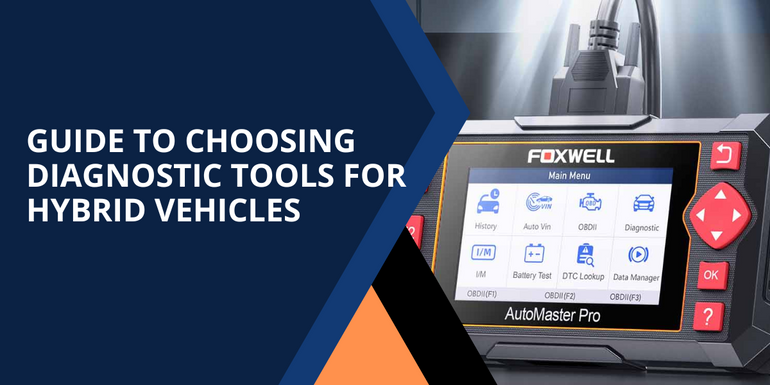Diagnosing problems in a hybrid vehicle takes more than just fixing what's broken; it also necessitates a grasp of how all of its components work together to keep your car running properly.
You might have spent your whole life around cars, fixing them or modifying them, but these hybrid cars will still fail your experience at some point.
Therefore, diagnostic tools for hybrid vehicles are significant to the seamless and effective operation of these dual-power systems.
Whether you're a professional mechanic or just a car enthusiast with some latest cars in your possession, the longevity of the vehicle and the precision of your diagnostics can be greatly impacted by the tool you choose.
What is Hybrid Diagnostics?
Unlike conventional cars, hybrids rely on a variety of interconnected systems, such as battery packs, electric motors, regenerative braking modules, and electronic control units (ECUs). For these components, diagnostic tools are required that extend beyond the normal capabilities of OBD2. Hybrid-specific trouble codes may be missed by general-purpose scanners, or they may not be able to access systems like the battery management unit or inverter control.
In this case, hybrid car diagnostic tools are helpful. They are designed to interpret signals and data unique to hybrid systems, enabling precise fault identification and preventative maintenance. Using a generic scanner could result in issues being overlooked, which could ultimately lead to financial and time losses.
How to Choose a Diagnostic Tool for Hybrid Vehicles
When you need a diagnostic tool for hybrid vehicles, you might not be able to rely on a simple tool. You need the one with suitable features. Many lower-end versions lack the technology or software needed to communicate with hybrid components, and not all tools are made equal.
So, what features to consider? Well, the best diagnostic scanner for hybrid cars will offer:
-
First, consider the variety of vehicles serviced to determine the prevalent types of battery systems. Hybrid vehicle service centres will benefit from equipment that supports both nickel-metal hydride and lithium-ion batteries.
-
Consider the size of your auto service shop and the expected volume of work with electric vehicles. For large service centres, we recommend equipment with multiple diagnostic channels that enable simultaneous module testing. Small car service centres may discover that smaller systems with fewer channels are sufficient.
-
Take note of the software capabilities included with the diagnostic equipment. A user-friendly interface, the ability to generate detailed reports in PDF format, and regular software upgrades are all significant considerations when selecting equipment for electric car diagnostics.
For further information on the characteristics, functioning, and pricing of electric vehicle diagnostic equipment, please contact the Equipment specialists.
From Simple to Complex: Types of diagnostic Tools you should know
There are many different options for a diagnostic scan tool for Australian cars available, ranging from professional-grade systems to entry-level handheld devices.
If you wonder what scanner works with hybrid vehicles?
The majority of contemporary hybrid cars require at the very least an OBD2-compliant scanner or the best hybrid vehicle diagnostic tools.
-
Simple OBD2 scanners: This is known to be the best auto diagnostic scan tool. It offers limited live data and standard trouble codes. They work well for inspecting minor engine or emissions-related problems.
-
Professional diagnostic tools: These frequently have large databases, brand-specific software, and sophisticated features like ECU programming and bi-directional testing.
-
Mobile app-based scanners: These connect to smartphones or tablets via Bluetooth or Wi-Fi. Due to their real-time visualisation capabilities and ease of use, they are becoming increasingly popular.
A professional or sophisticated scanner is usually more dependable for hybrid systems. If cost is a concern, consider mid-range tools that facilitate data access tailored to hybrid environments.
Top Mistakes to Avoid when Choosing a Hybrid Scanner
A common mistake first-time purchasers make is to assume that all OBD2 diagnostic scan tools operate similarly. No.
There are many different types of tools compatible with unique cars. So, you have to know which one is for your vehicle. Therefore, avoid the following pitfalls:
-
Ignoring hybrid compatibility: A tool designed for gasoline engines may not be able to read the electric drive system of a hybrid.
-
Ignoring software updates: An antiquated scanner cannot detect the most recent fault codes or protocols utilised in more recent hybrids.
-
Selecting a scanner solely based on cost: The features necessary to troubleshoot hybrid-specific systems properly are often absent from the least expensive option.
Not finding out which scanners are compatible with hybrid cars before making a purchase: Compare the year, make, and model of your car with the list of compatible models provided by the scanner.
Conclusion
Selecting the appropriate diagnostic tools for hybrid vehicles is crucial to ensure accurate fault detection and optimal long-term vehicle performance. Whether you're managing a service centre or maintaining your own car, investing in the right diagnostic scan tool helps avoid costly mistakes and ensures your hybrid runs efficiently.
At Auto Lines Australia, we understand the unique needs of modern hybrid systems and offer a range of reliable diagnostic tools designed for precision and compatibility. Explore our selection and find the perfect fit for your vehicle—because when it comes to hybrid maintenance, the right tools make all the difference.

